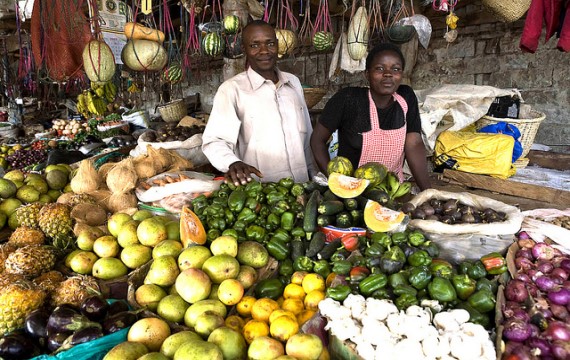Sovereign Food Systems

Local food systems are an expression of values, cultures, social relations and people’s self-determination. The act of feeding oneself and others embodies sovereignty, ownership and empowerment. When eating (with family, friends, and community), people reaffirm their cultural identities, their ownership over their life course and their human dignity. Food and nutrition is foundational for personal development and essential for overall wellbeing.
The concept of sovereignty was launched in 1996 at the World Food Summit in Rome by the global farmers’ movement ‘Via Campesina’ to counter large scale agricultural production and international agricultural trade liberalization. The concept is a protest against economic and political marginalization of small holder farmers. Food sovereignty challenges the mandates of international trade law and institutions that govern food trade. Farmer and other civil society movements have declared that individuals, communities and nations should have the right to define their own agricultural, food, fishing and land policies which are ecologically, socially, economically and culturally appropriate to their unique circumstances.
In preparation for the second International Conference on Nutrition (Rome, November 2014) international public interest civil society organizations presented their vision statement on nutrition1. It states that lasting solutions to the challenges of malnutrition in all its forms should be built around four domains for action including: Sovereign local food and agricultural systems based on agro-biodiversity.
The “global food system” depends on local food and agricultural systems. These systems are to be based on food sovereignty, small-scale food producers, agro-biodiversity, deep ecological foundations and sustainable use of natural resources, native seeds and traditional knowledge and practices, and local markets and value chains.
Governments have a strong role to play in reshaping the food system by ensuring that food and agriculture policies and investment lead to improved nutritional and health outcomes for all. In their statement public interest civil society organizations therefore call on Governments to fully embrace the “do no harm” principle as the baseline of any agricultural and food policy and ensure that these policies at a minimum do not harm people’s nutrition and rather aim at improving people’s nutrition status. As human health can only be realized within a healthy planet, it is also necessary that these policies take in full consideration the urgent need to sustainably realign production and consumption patterns to the planetary boundaries and the need for viable ecosystem services;
It is important to reaffirm the centrality of small-scale and family food producers as the key actors and drivers of local food systems and the main investors in agriculture, as internationally celebrated during 2014 being the International Year of Family Farming2. Their secure access to, and control over, productive assets such as land, water, seeds, technical and financial resources, and social protection, particularly for women, is essential for a diversified diet and adequate nutrition. In this context, it is also important to highlight the crucial role of healthy marine ecosystems, sustainable fisheries and sustainable aquaculture for enhancing food security and access to adequate, safe and nutritious food and in providing for the livelihoods of the people who depend on these ecosystems. It is therefore essential to enhance the resilience of agriculture and fisheries to the adverse impacts of climate change, ocean acidification and natural disasters.
Contents
Agro-biodiversity and community capacity building as key drivers of dietary diversity and nutritional wellbeing
Within international farmers’ and civil society movements there is concern about approaches that promote food fortification as the main path to address nutritional imbalances and purely technological fixes that do not recognize the social determinants of preventable malnutrition. Biodiversity loss - especially loss of diversity within crops and some animal species - is in itself an important cause of malnutrition. In this respect, agro-biodiversity and the development of new plant varieties need to build on traditional methods and approaches that protect native seeds rather than engaging in forms of genetic modification that may present grave consequences for biodiversity and food sovereignty. Farmers must also be protected against the contamination risks that GM crops might cause to conventional varieties and the associated contamination with agrochemicals, while it is necessary to emphasize policy and research support to a vibrant, public, plant breeding and conservation agenda led by farmer-researchers.
Rethinking food systems and promoting local and regional markets
The farmer and civil society movement promotes a definition of agricultural productivity that fully incorporates the agro-ecological, social, cultural and political dimensions of production and consumption, embodies the sustainable livelihoods of families and communities, is capable of providing for nutritious, healthy and diversified diets in line with culturally accepted eating patterns, and contributes to the reduction of the emission of greenhouse gases. In this context, the vibrancy of local and regional markets needs to be strengthened by appropriate infrastructural developments and needs to be protected against the rampant influx of ultra-processed foods, including breast milk substitutes. This should also include for example the reform of current local food procurement practice for school canteens, homes for the elderly and hospitals as well as social groceries to include clauses that privilege the provision of fresh local produce by small-scale local producers.
National Policy coherence and integration
In this context, it would be necessary to review national policies and investments and integrate nutrition objectives into food and agriculture as well as related policies, program designs and implementation, in order to enhance nutrition-sensitive agriculture, ensure food security and enable healthy diets. At the same time, this approach also requires coherent policies that protect, promote and support breastfeeding, encourage the consumption of nutritious foods, discourage the consumption of trans-fats and the overconsumption of ultra-processed products high in salt, sugar and saturated fats, ensure a hygienic environment, and promote physical activity
References
- ↑ Public Interest Civil Society Organizations Vision Statement on Nutrition, 13 November 2014
- ↑ International Year of Family Farming (IYFF)

